初一英语笔记
- 格式:doc
- 大小:82.00 KB
- 文档页数:8
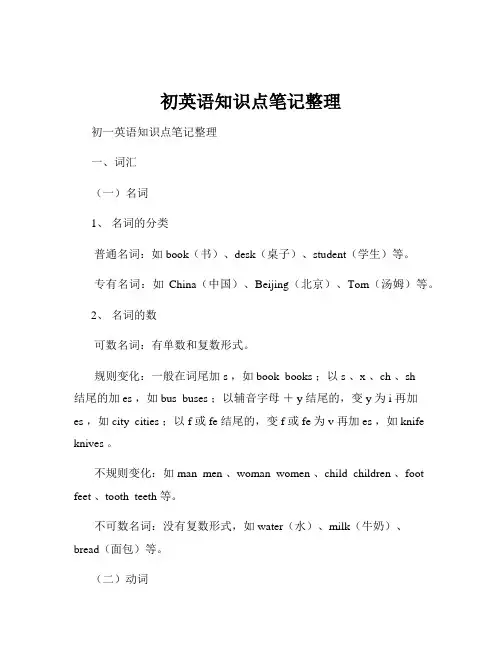
初英语知识点笔记整理初一英语知识点笔记整理一、词汇(一)名词1、名词的分类普通名词:如 book(书)、desk(桌子)、student(学生)等。
专有名词:如China(中国)、Beijing(北京)、Tom(汤姆)等。
2、名词的数可数名词:有单数和复数形式。
规则变化:一般在词尾加 s ,如 book books ;以 s 、x 、ch 、sh结尾的加 es ,如 bus buses ;以辅音字母+ y 结尾的,变 y 为 i 再加es ,如 city cities ;以 f 或 fe 结尾的,变 f 或 fe 为 v 再加 es ,如 knife knives 。
不规则变化:如 man men 、woman women 、child children 、foot feet 、tooth teeth 等。
不可数名词:没有复数形式,如 water(水)、milk(牛奶)、bread(面包)等。
(二)动词1、动词的种类实义动词:表示具体的动作,如 run(跑)、eat(吃)、study(学习)等。
系动词:如 be (am 、is 、are )、look(看起来)、sound(听起来)等。
助动词:如 do 、does 、did 等,用于构成疑问句和否定句。
情态动词:如 can (能、会)、may (可以)、must (必须)等。
2、动词的时态一般现在时:表示经常发生的动作或存在的状态。
主语是第三人称单数时,动词要用第三人称单数形式。
现在进行时:表示正在进行的动作,结构为“be +动词的现在分词”。
一般过去时:表示过去发生的动作,动词要用过去式。
(三)形容词和副词1、形容词:用于修饰名词,如 beautiful (美丽的)、big (大的)、good (好的)等。
2、副词:用于修饰动词、形容词或其他副词,如 quickly (快地)、very (非常)、carefully (仔细地)等。
3、形容词和副词的比较级和最高级规则变化:一般在词尾加 er 、est ,如 tall taller tallest ;以 e 结尾的加 r 、st ,如 nice nicer nicest ;重读闭音节词,双写末尾辅音字母再加 er 、est ,如 hot hotter hottest ;多音节词和部分双音节词,在前面加 more 、most ,如 interesting more interesting most interesting 。
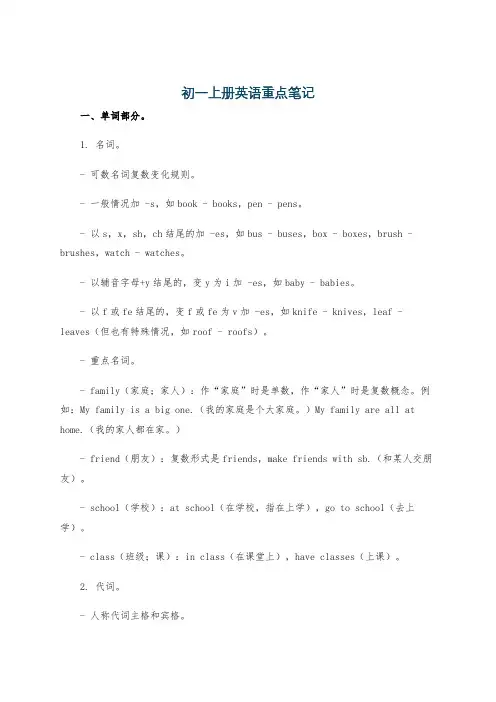
初一上册英语重点笔记一、单词部分。
1. 名词。
- 可数名词复数变化规则。
- 一般情况加 -s,如book - books,pen - pens。
- 以s,x,sh,ch结尾的加 -es,如bus - buses,box - boxes,brush - brushes,watch - watches。
- 以辅音字母+y结尾的,变y为i加 -es,如baby - babies。
- 以f或fe结尾的,变f或fe为v加 -es,如knife - knives,leaf - leaves(但也有特殊情况,如roof - roofs)。
- 重点名词。
- family(家庭;家人):作“家庭”时是单数,作“家人”时是复数概念。
例如:My family is a big one.(我的家庭是个大家庭。
)My family are all at home.(我的家人都在家。
)- friend(朋友):复数形式是friends,make friends with sb.(和某人交朋友)。
- school(学校):at school(在学校,指在上学),go to school(去上学)。
- class(班级;课):in class(在课堂上),have classes(上课)。
2. 代词。
- 人称代词主格和宾格。
- 主格:I(我),you(你;你们),he(他),she(她),it(它),we(我们),they(他们;她们;它们)。
- 宾格:me,you,him,her,it,us,them。
例如:I like him.(我喜欢他。
主格I作主语,宾格him作宾语)- 物主代词。
- 形容词性物主代词:my(我的),your(你的;你们的),his(他的),her (她的),its(它的),our(我们的),their(他们的;她们的;它们的)。
例如:This is my book.(这是我的书。
形容词性物主代词my修饰名词book)- 名词性物主代词:mine,yours,his,hers,its,ours,theirs。
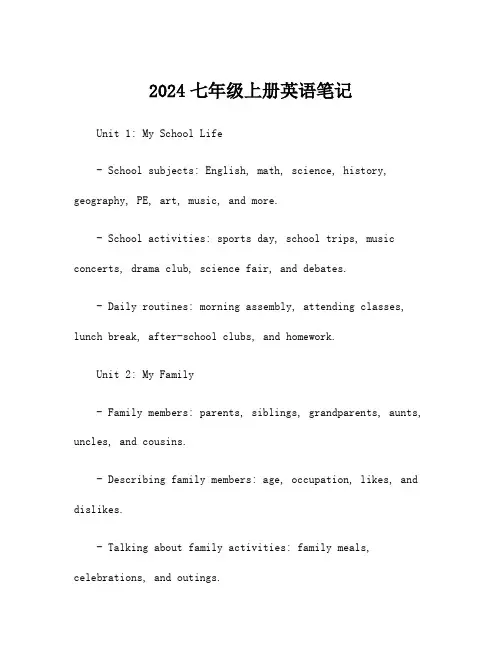
2024七年级上册英语笔记Unit 1: My School Life- School subjects: English, math, science, history, geography, PE, art, music, and more.- School activities: sports day, school trips, music concerts, drama club, science fair, and debates.- Daily routines: morning assembly, attending classes, lunch break, after-school clubs, and homework.Unit 2: My Family- Family members: parents, siblings, grandparents, aunts, uncles, and cousins.- Describing family members: age, occupation, likes, and dislikes.- Talking about family activities: family meals, celebrations, and outings.Unit 3: Daily Routine- Talking about daily activities: waking up, getting dressed, having breakfast, going to school, studying, doing chores, playing sports, and going to bed.- Time expressions: in the morning, in the afternoon, at night, etc.- Adverbs of frequency: always, usually, often, sometimes, rarely, never.Unit 4: Hobbies and Interests- Discussing hobbies: reading, drawing, playing musical instruments, painting, playing sports, collecting stamps, and more.- Asking about hobbies: What do you like to do in yourfree time?- Expressing likes and dislikes: I enjoy swimming. Idon't like watching TV.Unit 5: My Pets- Common pets: dogs, cats, fish, birds, rabbits, and turtles.- Describing pets: size, color, and personality traits.- Taking care of pets: feeding, walking, playing, and grooming.Unit 6: Food and Drinks- Food vocabulary: fruits, vegetables, meat, dairy products, grains, snacks, and beverages.- Discussing personal preferences: I love pizza. I don't like spicy food.- Ordering food at a restaurant: Can I have a hamburger, please?Unit 7: Health and Fitness- Talking about health issues: headache, stomachache, fever, and cold.- Giving advice: You should drink plenty of water when you have a fever.- Discussing healthy habits: eating balanced meals, exercising regularly, getting enough sleep, and avoiding junk food.Unit 8: My Neighborhood- Describing a neighborhood: houses, parks, schools, hospitals, stores, and streets.- Giving directions: Go straight, turn left/right, andit's on your left/right.- Talking about favorite places in the neighborhood: I like going to the park with my friends.Unit 9: Festivals and Celebrations- Celebrations: New Year's Eve, Christmas, birthdays, weddings, and national holidays.- Traditional customs and activities: fireworks, gift-giving, family gatherings, and special meals.- Expressing wishes and greetings: Happy New Year! Best wishes on your birthday!Unit 10: Traveling- Modes of transportation: car, train, airplane, boat, and bicycle.- Talking about travel experiences: I visited the Great Wall last summer.- Discussing travel plans: Where would you like to go for your next vacation?。
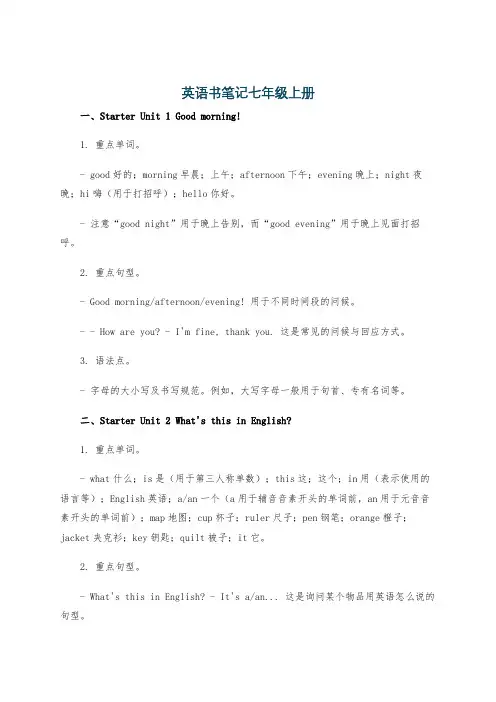
英语书笔记七年级上册一、Starter Unit 1 Good morning!1. 重点单词。
- good好的;morning早晨;上午;afternoon下午;evening晚上;night夜晚;hi嗨(用于打招呼);hello你好。
- 注意“good night”用于晚上告别,而“good evening”用于晚上见面打招呼。
2. 重点句型。
- Good morning/afternoon/evening! 用于不同时间段的问候。
- - How are you? - I'm fine, thank you. 这是常见的问候与回应方式。
3. 语法点。
- 字母的大小写及书写规范。
例如,大写字母一般用于句首、专有名词等。
二、Starter Unit 2 What's this in English?1. 重点单词。
- what什么;is是(用于第三人称单数);this这;这个;in用(表示使用的语言等);English英语;a/an一个(a用于辅音音素开头的单词前,an用于元音音素开头的单词前);map地图;cup杯子;ruler尺子;pen钢笔;orange橙子;jacket夹克衫;key钥匙;quilt被子;it它。
2. 重点句型。
- What's this in English? - It's a/an... 这是询问某个物品用英语怎么说的句型。
- Spell it, please. -... 用于请求对方拼写单词。
3. 语法点。
- 不定冠词a和an的用法区别。
例如,“an apple”,“a book”。
三、Starter Unit 3 What color is it?1. 重点单词。
- color颜色;red红色(的);blue蓝色(的);black黑色(的);white白色(的);purple紫色(的);yellow黄色(的);green绿色(的);the定冠词,表示特指。
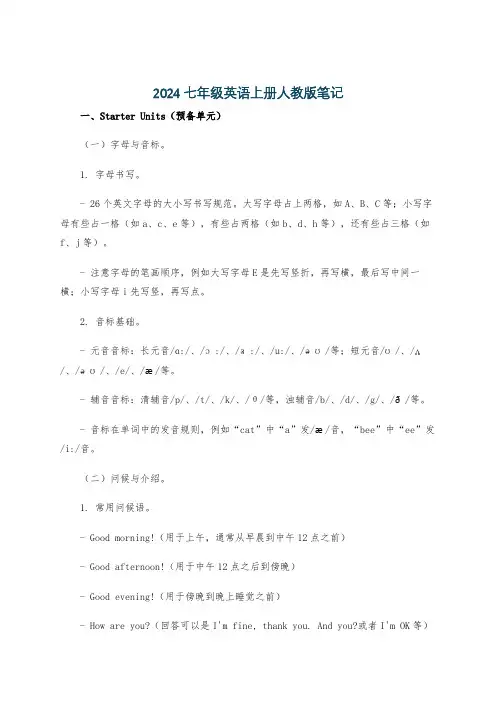
2024七年级英语上册人教版笔记一、Starter Units(预备单元)(一)字母与音标。
1. 字母书写。
- 26个英文字母的大小写书写规范。
大写字母占上两格,如A、B、C等;小写字母有些占一格(如a、c、e等),有些占两格(如b、d、h等),还有些占三格(如f、j等)。
- 注意字母的笔画顺序,例如大写字母E是先写竖折,再写横,最后写中间一横;小写字母i先写竖,再写点。
2. 音标基础。
- 元音音标:长元音/ɑ:/、/ɔ:/、/ɜ:/、/u:/、/əʊ/等;短元音/ʊ/、/ʌ/、/əʊ/、/e/、/æ/等。
- 辅音音标:清辅音/p/、/t/、/k/、/θ/等,浊辅音/b/、/d/、/g/、/ð/等。
- 音标在单词中的发音规则,例如“cat”中“a”发/æ/音,“bee”中“ee”发/i:/音。
(二)问候与介绍。
1. 常用问候语。
- Good morning!(用于上午,通常从早晨到中午12点之前)- Good afternoon!(用于中午12点之后到傍晚)- Good evening!(用于傍晚到晚上睡觉之前)- How are you?(回答可以是I'm fine, thank you. And you?或者I'm OK等)2. 自我介绍。
- My name's...(例如My name's Tom.)- I'm...(I'm a student.)二、Unit 1 My name's Gina.(一)重点单词。
1. name.- 名词,名字。
例如:What's your name?2. nice.3. to.- 在这里是不定式符号,如Nice to meet you中的to;也可作介词,表示“到……”,例如go to school。
4. meet.- 动词,遇见;会面。
例如:Nice to meet you.5. too.- 副词,也;太。
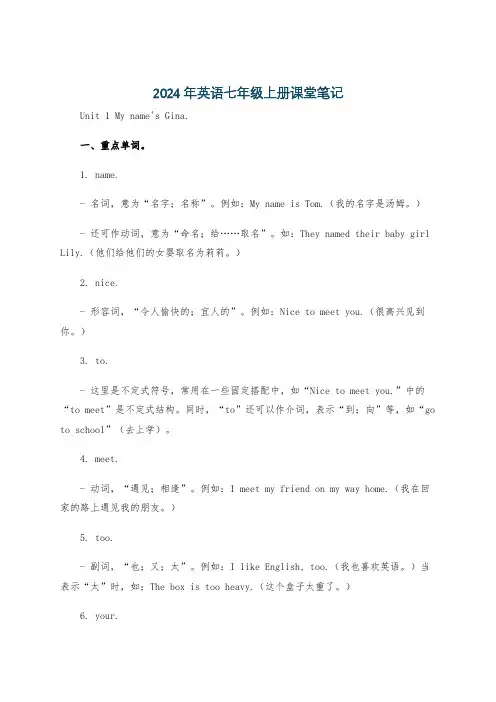
2024年英语七年级上册课堂笔记Unit 1 My name's Gina.一、重点单词。
1. name.- 名词,意为“名字;名称”。
例如:My name is Tom.(我的名字是汤姆。
)- 还可作动词,意为“命名;给……取名”。
如:They named their baby girl Lily.(他们给他们的女婴取名为莉莉。
)2. nice.- 形容词,“令人愉快的;宜人的”。
例如:Nice to meet you.(很高兴见到你。
)3. to.- 这里是不定式符号,常用在一些固定搭配中,如“Nice to meet you.”中的“to meet”是不定式结构。
同时,“to”还可以作介词,表示“到;向”等,如“go to school”(去上学)。
4. meet.- 动词,“遇见;相逢”。
例如:I meet my friend on my way home.(我在回家的路上遇见我的朋友。
)5. too.- 副词,“也;又;太”。
例如:I like English, too.(我也喜欢英语。
)当表示“太”时,如:The box is too heavy.(这个盒子太重了。
)6. your.- 形容词性物主代词,“你的;你们的”。
例如:Your book is on the desk.(你的书在桌子上。
)7. his.- 形容词性物主代词,“他的”。
例如:His name is Jack.(他的名字是杰克。
)8. her.- 形容词性物主代词,“她的”。
例如:Her pen is red.(她的钢笔是红色的。
)二、重点短语。
1. name's = name is.- 例如:My name's Gina. = My name is Gina.(我的名字是吉娜。
)2. nice to meet you.- 用于初次见面时的问候语,回答是“Nice to meet you, too.”(很高兴见到你。
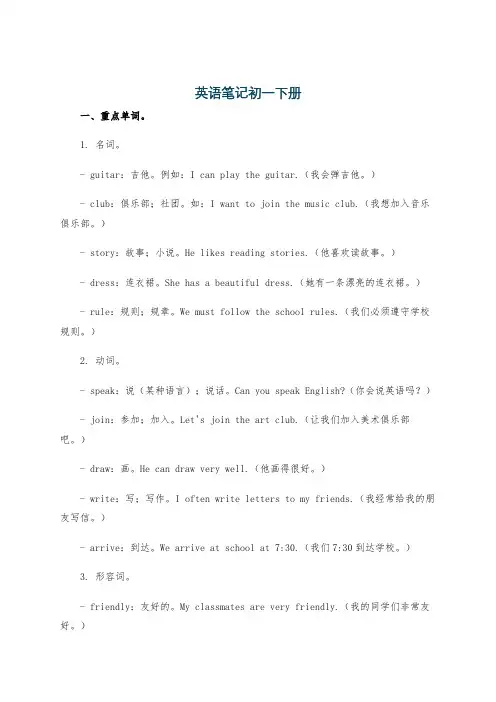
英语笔记初一下册一、重点单词。
1. 名词。
- guitar:吉他。
例如:I can play the guitar.(我会弹吉他。
)- club:俱乐部;社团。
如:I want to join the music club.(我想加入音乐俱乐部。
)- story:故事;小说。
He likes reading stories.(他喜欢读故事。
)- dress:连衣裙。
She has a beautiful dress.(她有一条漂亮的连衣裙。
)- rule:规则;规章。
We must follow the school rules.(我们必须遵守学校规则。
)2. 动词。
- speak:说(某种语言);说话。
Can you speak English?(你会说英语吗?)- join:参加;加入。
Let's join the art club.(让我们加入美术俱乐部吧。
)- draw:画。
He can draw very well.(他画得很好。
)- write:写;写作。
I often write letters to my friends.(我经常给我的朋友写信。
)- arrive:到达。
We arrive at school at 7:30.(我们7:30到达学校。
)3. 形容词。
- friendly:友好的。
My classmates are very friendly.(我的同学们非常友好。
)- quiet:安静的。
The library is a quiet place.(图书馆是一个安静的地方。
)- noisy:吵闹的。
Don't be noisy in class.(不要在课堂上吵闹。
)二、重点短语。
1. play the guitar/piano/violin:弹吉他/钢琴/小提琴。
注意乐器前要加the。
2. want to do sth:想要做某事。
例如:I want to play basketball.(我想要打篮球。
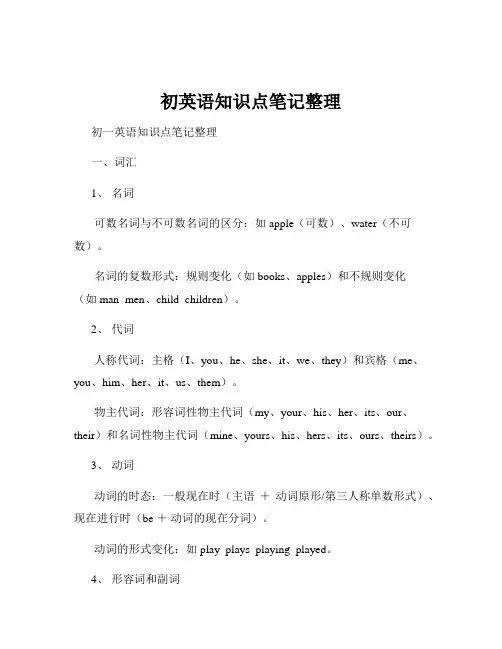
初英语知识点笔记整理初一英语知识点笔记整理一、词汇1、名词可数名词与不可数名词的区分:如 apple(可数)、water(不可数)。
名词的复数形式:规则变化(如 books、apples)和不规则变化(如 man men、child children)。
2、代词人称代词:主格(I、you、he、she、it、we、they)和宾格(me、you、him、her、it、us、them)。
物主代词:形容词性物主代词(my、your、his、her、its、our、their)和名词性物主代词(mine、yours、his、hers、its、ours、theirs)。
3、动词动词的时态:一般现在时(主语+动词原形/第三人称单数形式)、现在进行时(be +动词的现在分词)。
动词的形式变化:如 play plays playing played。
4、形容词和副词形容词的比较级和最高级:规则变化(如 tall taller tallest)和不规则变化(如 good better best)。
副词的用法:用于修饰动词、形容词或其他副词。
5、介词常见介词的用法:如 in、on、at、for、with 等。
二、语法1、句子结构简单句:主语+谓语+宾语。
复合句:如宾语从句、状语从句等。
2、疑问句一般疑问句:以 be 动词、助动词或情态动词开头,用 yes 或 no 回答。
特殊疑问句:以特殊疑问词(what、where、when、why、how 等)开头。
3、冠词定冠词 the 的用法:特指、上文提到过的等。
不定冠词 a/an 的用法:泛指。
三、日常交际用语1、问候与告别Hello! / Hi! (问候)Goodbye! / Bye! (告别)2、感谢与道歉Thank you (感谢)I'm sorry (道歉)3、邀请与应答Would you like to?(邀请)Yes, I'd love to / No, thanks (应答)4、购物How much is it? (询问价格)It's (回答价格)5、指路与问路Go along this street (指路)Excuse me Where is?(问路)四、阅读理解1、阅读技巧快速浏览文章,了解大意。
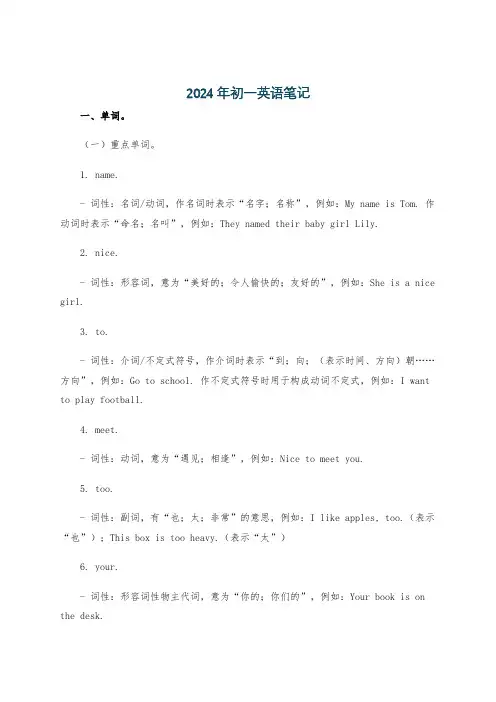
2024年初一英语笔记一、单词。
(一)重点单词。
1. name.- 词性:名词/动词,作名词时表示“名字;名称”,例如:My name is Tom. 作动词时表示“命名;名叫”,例如:They named their baby girl Lily.2. nice.- 词性:形容词,意为“美好的;令人愉快的;友好的”,例如:She is a nice girl.3. to.- 词性:介词/不定式符号,作介词时表示“到;向;(表示时间、方向)朝……方向”,例如:Go to school. 作不定式符号时用于构成动词不定式,例如:I want to play football.4. meet.- 词性:动词,意为“遇见;相逢”,例如:Nice to meet you.5. too.- 词性:副词,有“也;太;非常”的意思,例如:I like apples, too.(表示“也”);This box is too heavy.(表示“太”)6. your.- 词性:形容词性物主代词,意为“你的;你们的”,例如:Your book is on the desk.(二)单词记忆方法。
1. 联想法。
- 对于“name”这个单词,可以联想一个有名字的人或者事物,比如名人的名字。
像“Taylor Swift”,她的名字全世界很多人都知道,这样就容易记住“name”这个单词的含义。
2. 对比记忆法。
- 对比“too”和“to”。
“too”有“也”的意思,在句子中经常用于句末,而“to”更多的是表示方向或者用于构成不定式。
例如:I go to school.(“to”表示方向),I like music, too.(“too”表示“也”)二、短语。
1. nice to meet you.- 用法:用于初次见面时的问候语,回答通常是“Nice to meet you, too.”- 例句:A: Nice to meet you. B: Nice to meet you, too.2. be from.- 用法:表示“来自……”,后面接地点名词。
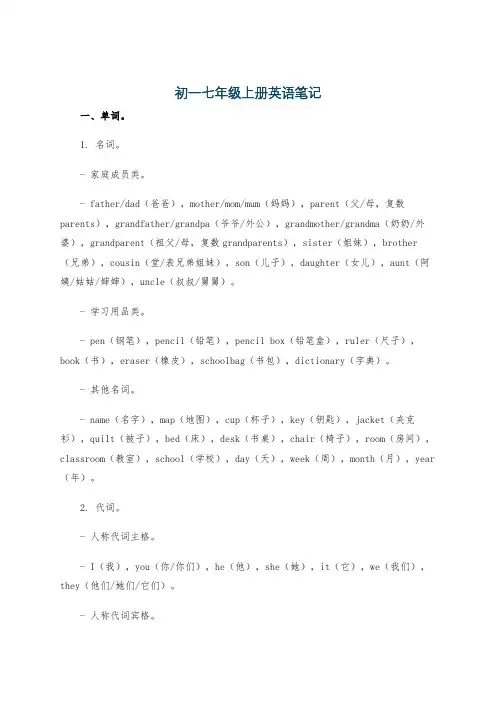
初一七年级上册英语笔记一、单词。
1. 名词。
- 家庭成员类。
- father/dad(爸爸),mother/mom/mum(妈妈),parent(父/母,复数parents),grandfather/grandpa(爷爷/外公),grandmother/grandma(奶奶/外婆),grandparent(祖父/母,复数grandparents),sister(姐妹),brother (兄弟),cousin(堂/表兄弟姐妹),son(儿子),daughter(女儿),aunt(阿姨/姑姑/婶婶),uncle(叔叔/舅舅)。
- 学习用品类。
- pen(钢笔),pencil(铅笔),pencil box(铅笔盒),ruler(尺子),book(书),eraser(橡皮),schoolbag(书包),dictionary(字典)。
- 其他名词。
- name(名字),map(地图),cup(杯子),key(钥匙),jacket(夹克衫),quilt(被子),bed(床),desk(书桌),chair(椅子),room(房间),classroom(教室),school(学校),day(天),week(周),month(月),year (年)。
2. 代词。
- 人称代词主格。
- I(我),you(你/你们),he(他),she(她),it(它),we(我们),they(他们/她们/它们)。
- 人称代词宾格。
- me(我),you(你/你们),him(他),her(她),it(它),us(我们),them(他们/她们/它们)。
- 物主代词。
- 形容词性物主代词:my(我的),your(你的/你们的),his(他的),her (她的),its(它的),our(我们的),their(他们/她们/它们的)。
- 名词性物主代词:mine(我的),yours(你的/你们的),his(他的),hers (她的),its(它的),ours(我们的),theirs(他们/她们/它们的)。
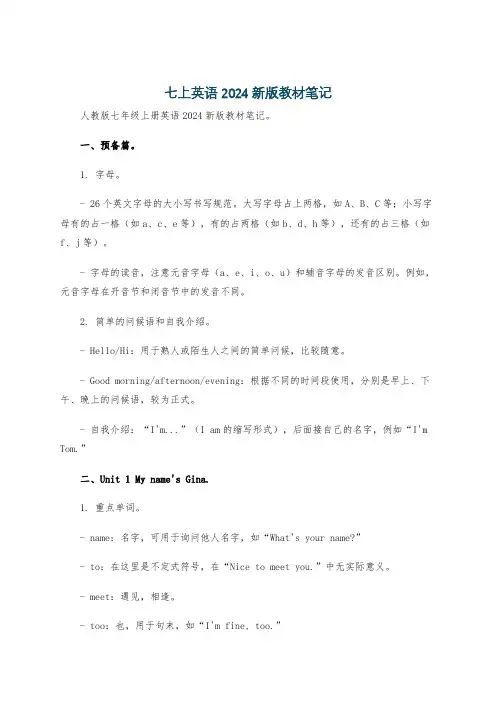
七上英语2024新版教材笔记人教版七年级上册英语2024新版教材笔记。
一、预备篇。
1. 字母。
- 26个英文字母的大小写书写规范。
大写字母占上两格,如A、B、C等;小写字母有的占一格(如a、c、e等),有的占两格(如b、d、h等),还有的占三格(如f、j等)。
- 字母的读音,注意元音字母(a、e、i、o、u)和辅音字母的发音区别。
例如,元音字母在开音节和闭音节中的发音不同。
2. 简单的问候语和自我介绍。
- Hello/Hi:用于熟人或陌生人之间的简单问候,比较随意。
- Good morning/afternoon/evening:根据不同的时间段使用,分别是早上、下午、晚上的问候语,较为正式。
- 自我介绍:“I'm...”(I am的缩写形式),后面接自己的名字,例如“I'm Tom.”二、Unit 1 My name's Gina.1. 重点单词。
- name:名字,可用于询问他人名字,如“What's your name?”- to:在这里是不定式符号,在“Nice to meet you.”中无实际意义。
- meet:遇见,相逢。
- too:也,用于句末,如“I'm fine, too.”- your:你的,你们的,是形容词性物主代词,后面要接名词,如“your name”。
- his:他的;her:她的,这两个也是形容词性物主代词。
2. 重点句型。
- What's your name?- 回答:“My name's...”或者“I'm...”。
- Nice to meet you.- 回答:“Nice to meet you, too.”- Is he/she...?- 回答:“Yes, he/she is.”或者“No, he/she isn't.”例如“Is he Tom? Yes, he is.”三、Unit 2 This is my sister.1. 重点单词。
初英语知识点笔记整理初一英语知识点笔记整理一、词汇1、名词可数名词和不可数名词的区分:可数名词有复数形式,如 apples、books;不可数名词没有复数形式,如 water、milk。
名词所有格:表示所属关系,如 Tom's book(汤姆的书)、thegirls' room(女孩们的房间)。
2、动词动词的时态:一般现在时(主语+动词原形/第三人称单数形式),如 I play football He plays football 现在进行时(be +动词的现在分词),如 I am reading a book动词的不定式:to +动词原形,如 I want to go home3、形容词和副词形容词用于修饰名词,如 a beautiful flower。
副词用于修饰动词、形容词或其他副词,如He runs fast very good。
形容词和副词的比较级和最高级:如 good better best,fast faster fastest。
4、代词人称代词:I、you、he、she、it、we、they。
物主代词:my、your、his、her、its、our、their。
指示代词:this、that、these、those。
5、数词基数词:one、two、three 等。
序数词:first、second、third 等。
二、语法1、句子成分主语:句子中表示动作的执行者或主体,如I study English 中的I。
谓语:表示主语的动作或状态,如 study 就是谓语。
宾语:动作的对象,如 I read a book 中的 a book。
定语:修饰名词或代词,如 a red apple 中的 red。
状语:修饰动词、形容词、副词或整个句子,如 He runs fast 中的fast。
2、句子类型陈述句:用来陈述事实,如 I am a student疑问句:包括一般疑问句(用 yes 或 no 回答),如 Are you a teacher? 特殊疑问句(用具体内容回答),如 What's your name? 选择疑问句(从提供的选项中选择回答),如 Do you like apples or bananas? 反意疑问句(前肯后否,前否后肯),如 You are a student, aren't you?祈使句:表示请求、命令、建议等,如 Open the door感叹句:表达强烈的情感,如 What a beautiful flower! How beautiful the flower is!3、介词常见的介词:at、in、on、under、behind、beside、between 等。
英语知识点归纳笔记初一1. 代词 (Pronouns)代词用于替代名词,可以分为人称代词、物主代词、指示代词、不定代词等。
常见的代词有:- 人称代词 (Personal Pronouns):I, you, he, she, it, we, they- 物主代词 (Possessive Pronouns):mine, yours, his, hers, its, ours, theirs- 指示代词 (Demonstrative Pronouns):this, that, these, those- 不定代词 (Indefinite Pronouns):someone, something, anybody, anything, nobody, nothing2. 名词 (Nouns)名词用来表示人、动物、事物、地点等具体或抽象的东西。
名词可分为可数名词和不可数名词。
可数名词可以用单数形式或复数形式,而不可数名词只有单数形式。
名词还可以分为普通名词和专有名词。
3. 动词 (Verbs)动词是句子中最重要的一部分,用来表示动作或状态。
动词可以分为及物动词和不及物动词。
及物动词后面需要接宾语,而不及物动词不需要。
动词还可以根据时态来表示动作的发生时间,如一般现在时、一般过去时、一般将来时等。
4. 形容词 (Adjectives)形容词用来描述名词或代词的特征或性质。
形容词可以放在名词之前,也可以放在系动词之后。
形容词还可以根据比较级和最高级来进行比较,如高级、低级等。
5. 副词 (Adverbs)副词用来修饰动词、形容词或其他副词,表示时间、地点、程度、方式等。
副词通常以 -ly 结尾。
6. 冠词 (Articles)冠词用来限定名词的范围。
英语中有三个冠词:a, an, the。
其中,a 和 an 是不定冠词,用来表示泛指;the 是定冠词,用来表示特指。
7. 介词 (Prepositions)介词用来表示名词与其他单词之间的关系,通常位于名词前面。
7年级上册英语笔记一、单词部分。
1. be动词(am/is/are)- 我(I)用am,这个超简单,就像我总是独一无二的,所以是I am。
比如I am a student.(我是一名学生。
)- 他(he)、她(she)、它(it)用is。
想象一下,一个人或者一个东西单独存在的时候,就用is。
He is my father.(他是我的爸爸。
)She is my sister.(她是我的姐姐。
)It is a cat.(它是一只猫。
)- 你(you)、我们(we)、他们(they)用are。
你和小伙伴们在一起的时候,人多力量大,就用are啦。
You are my friend.(你是我的朋友。
)We are in the same class.(我们在同一个班级。
)They are my classmates.(他们是我的同班同学。
)2. 名词复数。
- 一般情况直接加 -s,就像给单词穿个小尾巴。
book - books(书 - 书复数),pen - pens(钢笔 - 钢笔复数)。
- 以s,x,ch,sh结尾的加 -es。
这就像特殊待遇,因为这些结尾的单词有点特别。
box - boxes(盒子 - 盒子复数),watch - watches(手表 - 手表复数)。
- 以辅音字母 + y结尾的,把y变成i再加 -es。
这就像是单词要变形啦。
baby - babies(婴儿 - 婴儿复数)。
不过要注意哦,如果是元音字母+y结尾,直接加 -s 就行,像day - days(天 - 天复数)。
3. 形容词性物主代词。
- my(我的),这是最常用的啦,就像我的东西我做主。
This is my book.(这是我的书。
)- your(你的、你们的),不管是和一个人说“你的”,还是和一群人说“你们的”,都用your。
Your pen is very nice.(你的钢笔很漂亮。
)- his(他的),专指男性的他。
2024英语七年级上册笔记一、Unit 1 My name's Gina.1. 重点单词。
- name:n. 名字;名称。
例如:My name is Tom.- nice:adj. 令人愉快的;宜人的。
常用搭配:nice to meet you(很高兴见到你)。
- to:prep. 常用于动词不定式符号,无实际意义;也可作介词,表示“到;向”等。
例如:Nice to meet you.(这里的to是不定式符号);Go to school.(这里的to是介词,表示“到……去”)- meet:v. 遇见;相逢。
例如:I meet my friend at the park.- too:adv. 也;又;太。
例如:I like apples, too.(表示“也”);The box is too heavy.(表示“太”)- your:pron. 你的;你们的。
例如:Your book is on the desk.2. 重点句型。
- What's your name? 你叫什么名字?回答:My name's...或者I'm...。
例如:- A: What's your name?- B: My name's Lily.- Nice to meet you. 很高兴见到你。
回答:Nice to meet you, too.- I'm... 我是……。
例如:I'm Jack.3. 语法。
- 形容词性物主代词:your(你的;你们的)。
形容词性物主代词后面要接名词。
例如:your pen(你的钢笔)。
二、Unit 2 This is my sister.1. 重点单词。
- sister:n. 姐;妹。
例如:My sister is a student.- brother:n. 兄;弟。
例如:His brother likes playing football.- parent:n. 父(母)亲。
英语初一上册笔记一、Starter Units 1 - 3。
1. 字母。
- 26个英文字母的大小写书写规范。
大写字母占上两格,如A、B、C等;小写字母有些占一格(如a、c、e等),有些占两格(如b、d、h等),有些占三格(如f、j等)。
- 字母的读音,元音字母(a, e, i, o, u)和辅音字母的发音区别。
例如,元音字母在开音节和闭音节中的发音不同。
2. 单词。
- 简单的问候语单词:hello(你好),hi(嗨),goodbye(再见),bye(拜拜)。
- 颜色单词:red(红色),blue(蓝色),green(绿色),yellow(黄色),black(黑色),white(白色)。
记忆方法可以采用联想记忆,比如红色联想到苹果,蓝色联想到天空等。
- 表示人物关系的单词:father(父亲),mother(母亲),sister(姐妹),brother(兄弟)。
3. 句型。
- 问候句型:- - Hello! How are you? - I'm fine, thank you.- - Hi! Good morning/afternoon/evening.- 介绍句型:- - This is my father/mother/sister/brother.- - My name is... I'm... years old.二、Unit 1 My name's Gina.1. 重点单词。
- name(名字),nice(美好的),to(不定式符号,无实义),meet(遇见),too(也),your(你的,你们的),his(他的),her(她的)。
- 关于名字的单词:first name(名),last name(姓),例如在英语中,名字在前姓在后,而在中国姓在前名字在后。
2. 重点句型。
- - What's your name? - My name's Gina.- - Nice to meet you. - Nice to meet you, too.- - Is he Jack? - Yes, he is./No, he isn't.- - Are you Helen? - Yes, I am./No, I'm not.3. 语法点。
七年级上册英语课堂笔记全部一、Starter Units 1 - 3。
(一)重点单词。
1. 问候语相关。
- hello(你好),hi(嗨),good(好的),morning(早晨;上午),afternoon(下午),evening(晚上;傍晚)。
- 用法:“Good morning/afternoon/evening”用于不同时间段的问候。
例如:Good morning! 用于早晨到中午之前的问候。
2. 字母相关。
- 26个英文字母的大小写形式、读音。
大写字母如A - Z,小写字母如a - z。
- 字母的书写规范:字母在四线三格中的位置,如a, c, e等占中间一格;b, d, h等占上两格;g, p, q等占下两格;f占三格。
3. 颜色类。
- red(红色),blue(蓝色),green(绿色),black(黑色),white(白色),yellow(黄色)。
- 例如:This pen is blue.(这支笔是蓝色的。
)(二)重点句型。
1. - How are you? - I'm fine, thank you. And you? - I'm OK.- 这是常见的问候与回应的句型。
“How are you?”用于询问对方的身体状况或近况,回答可以是“fine”(身体好)、“OK”(还不错)等,并且可以反问对方“And you?”。
2. - What's this/that in English? - It's a/an...- 用于询问某个物品用英语怎么说。
例如:What's this in English? It's a book.(这个用英语怎么说?它是一本书。
)注意a用于以辅音音素开头的单词前,an 用于以元音音素开头的单词前,如an apple。
二、Unit 1 My name's Gina.(一)重点单词。
1. 名字相关。
- name(名字),first name(名),last name/family name(姓)。
初一英语笔记——————————————————————————————————目录n.名词v.动词adj.形容词prep.介词adv.副词num.数词一、初一(上)1、Starter2、Module13、Module 2二、初一(下)初一(上)Starter(预备级)Module 1 My teacher and my friendUnit1 Hello, Miss Li.Unit2 Good morning. I'm Tom Hanks.Unit3 This is my friend.Module 2 My classroom and my bodyUnit1 It's a classroom.Unit2 Please touch your head.Unit3 How many are there?Module 3 Colours, things and foodUnit1 What colour is the apple?Unit2 Where's my coat?Unit3 What's your favourite food?Module 4 Activities and the weatherUnit1 I like reading.Unit2 I can dance.Unit3 What's the weather like in summer?重点句型与单词Class, please stand up. Hello, class.Please sit down. Yes, Miss Li.{ Ms 未知婚否女士{ Miss 未婚{ Mrs 已婚,随夫姓A B C D E F G H I J K L M N O P Q R S T U V W X Y Za b c d e f g h i j k l m n o p q r s t u v w x y zGood morning. Good afternoon. How are you?Fine, thanks. What's your name? I'm ... ask. check Sorry?(I bay you pardon?) 能否再说一遍,我没听清。
This is my ... He's (He is) ... She's (She is) ...listen match(n.连线)number point say singwork in pairs write ask check boy daughter(n.女儿)girl father friend mother son teacher bottle(n.瓶子)What's this in English? It's a pen.What are these? They're...Touch your.. 摸你的……How many desks are there? There are ten desks.Number:zero one two three four five six seven eight nine tenbag book classroom chair desk map pen window arm ear foot hair hand leg mouth nose a nose an arm hands feetdesks /ks/ (轻辅音)birds /dz/ (浊辅音)How many + 可数名词复数+ are there?There is/are + 数字+可数名词(复数)What colour is(are) the + 名词单数(复数)It's...(They're...)The 特指这只(名词)Where + be(am/are/is) + 名词性物主代词+ n ?(谁)的(名词)在哪儿?It's/They're + prep. + the + 地点(n.)特殊疑问词:what why when which who whose where howapple banana bird black blue flower green purple pink orange white gray(灰色) brown golden red tree white yellow bed cap coat Mum my on shoe under cake Dad egg fish food meat noodle pear ricefish rice meat 为不可数名词fruit和food 既可以为可数名词,又可以为不可数名词(有很多的……)(表示总体)Sport 指单一运动时不可数。
例:He's good at sport.表做运动时,加"s"。
例:He likes doing sports.Sportsman 运动员第三人称单数时行为动词后要有s可数名词单复转化(不可数名词没有复数形式)一般在名词末尾加"s": apple---apples banana---bananas以s sh ch x 结尾的末尾加es : box---boxes dish--dishes以fe f 结尾的把fe/f 变为以辅音字母+ y结尾的把y变i加es:baby---babiesPlay+ 体育运动like + doing sth.+ the + 乐器+ to do sth+ n.Type /taip/ 打字Weather 天气What's the weather like in summer?Like (v.) 喜欢———Do you like dancing?(prep.)像———They are like the brothers. Be like 像……season 季节:spring summer autumn winter(warm hot cool cold )What is th weather like in + 地点(+ 季节)Module 1 Nice to meet youWords:meet 遇见,认识first 第一English 英语lesson (一节)课class 班级(课)student 学生Miss 女士;小姐twelve 十二year ……岁thirteen 十三too 也from 从……来close 关闭open 打开match 相称;匹配write 写practise 练习city 城市English 英国的fourteen 十四eleven 十一blackboard 黑板twenty-nine 二十九fifty 五十拓展:have class 上课second 第二match(n.) 比赛;火柴practice(n.) 练习Unit1 The first English lessonself-introduction 自我介绍My name's = My name isbe from = 主语+ come from 来自……He/She comes from Nanning. 他来自南宁。
Where is he/she (are they/you) from? ……来自哪里?转折用but 连接I'm + 班级+ 年级(从小到大)I'm in Class One, Grade Seven. 我在七年级一班。
班级、年级的两个开头字母都要大写年龄:...years old 表示年龄(1岁用year)He's two years (one year) old.How old + be + ... (谁)几岁了?介绍用This is/These are/That is/Those are请把这些图片与单词连线:Please match the pictures with the words.Unit2 I'm from China and I'm Chinese.Read and complete the table(表格).She's = She is I'm = I amIs not = isn't are not = aren'tam not 不能缩写为amn't,I am not 只能写为I'm not动词be一般现在时的一般疑问句是把be提至句首,其否定句式的构成是在be 后直接加not。
with 介词,与……,后一般接名词或代词and 连词,和,后接并列相近例:I'm in Class One with Daming and Lingling.Peter is in Class Three with Mary.Peter and Mary are in Class Three.在同一个班:in the same class.Unit3He comes from England. 他来自英国。
(第三人称单数)match ... With 与……连接Match the words with the pictures.read book sit down stand up writ on the blackboard姓------family name----last name-----surname名------given name-----first name-----middle nameTeach(v.)教practise + Ving(动词+ing)He practises singing every day.Module 2 Me, my parents and my friends.Words:parent 父;母can能够basketball 篮球piano 钢琴tennis网球table tennis 乒乓球ride 汽;开(车)horse 马welcome欢迎international 国际的factory 工厂hotel 饭店;宾馆university 大学hospital 医院worker 工人manager 经理secretary 秘书at 在(地点);向,朝photo 照片family 家庭her 她的拓展:parents父母-----grandparents 祖父母can = be able toInternet 互联网test 考试Unit1 I can speak English.can + V原(can 是情态动词,后接动词原型)welcome(v.) Thank you!-----You are welcome.Welcome (sb.) to spl(some place) 欢迎某人到某地speak + 某种语言speak to sb 与某人说话say 单人说话talk 交谈⑴talk about sth. 谈论某件事⑵with(to) sb. 与某人交谈Unit2 These are my parents.profession 职业 an office 一间办公室 a university 一所大学 solder 军人 red cross(交叉的)红十字 These are 这些是(复)-----This is 这是(单) Those are 那些是(复)-----That is 那是(单)This is Betty's mother.----------These are Betty's parents.at + 小地点 表示特定地点大写:例-----Beijing International School in + 大地点 Big Ben at/in the hospital 在医院工作 at/in hospital 住院Capital letter 首字母 full stop 句点(。